Texas A&M University School of Law is proud of the accomplishments its Aggie Dispute Resolution team has achieved:
- Judges, lawyers and other academics are recognizing the value of our faculty’s scholarly contributions with awards and citations. Scroll down to view our faculty and student highlights and recent faculty scholarship.
- We have dramatically expanded our students’ understanding of dispute resolution with new introductory courses as well as advanced courses highlighting both local developments and dispute resolution in other parts of the world. Scroll down to read more in our curriculum highlights.
- Our annual dispute resolution symposia are bringing together public officials, judges, lawyers, dispute resolution neutrals, court administrators and academics to grapple with important issues, such as the need for greater transparency regarding dispute resolution and how dispute resolution neutrals can help communities recover from the effects of natural disasters. Scroll down to learn about all of our recent and upcoming event highlights.
FACULTY AND STUDENT HIGHLIGHTS
Professor Cynthia Alkon recently completed two years as Associate Dean at Texas A&M Law, 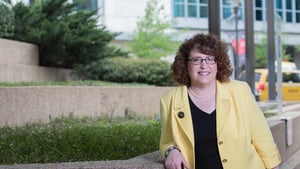 where she played a key role in the Law School faculty’s decision to require all 1Ls to take a 1-credit intensive course that introduces them to negotiation, mediation, arbitration and other innovative dispute resolution processes. She is currently a Visiting Professor, teaching Criminal Law, at the Dedman School of Law of Southern Methodist University. During the summer of 2018, Professor Alkon traveled to Yangon, Myanmar to conduct a training course for trainers on the Legal Aid Toolkit for Tetra Tech DPK’s Promoting the Rule of Law Project in Myanmar (funded by USAID). In 2019, Professor Alkon and Professor Andrea Schneider will publish a groundbreaking legal education textbook that builds on Professor Alkon’s scholarship focusing on the intersection between dispute resolution and the criminal justice system—Negotiating Crime: Plea Bargaining, Problem Solving, and Dispute Resolution in the Criminal Context. Professor Jennifer Reynolds used the current manuscript of the book for Advanced Negotiation: ADR in Criminal Contexts, a course she taught at Harvard Law School in Spring 2018.
where she played a key role in the Law School faculty’s decision to require all 1Ls to take a 1-credit intensive course that introduces them to negotiation, mediation, arbitration and other innovative dispute resolution processes. She is currently a Visiting Professor, teaching Criminal Law, at the Dedman School of Law of Southern Methodist University. During the summer of 2018, Professor Alkon traveled to Yangon, Myanmar to conduct a training course for trainers on the Legal Aid Toolkit for Tetra Tech DPK’s Promoting the Rule of Law Project in Myanmar (funded by USAID). In 2019, Professor Alkon and Professor Andrea Schneider will publish a groundbreaking legal education textbook that builds on Professor Alkon’s scholarship focusing on the intersection between dispute resolution and the criminal justice system—Negotiating Crime: Plea Bargaining, Problem Solving, and Dispute Resolution in the Criminal Context. Professor Jennifer Reynolds used the current manuscript of the book for Advanced Negotiation: ADR in Criminal Contexts, a course she taught at Harvard Law School in Spring 2018.
Professor Guillermo Garcia published several dispute resolution-related articles and book chapters in the last year. The Blurring of the Public/Private Distinction or the Collapse of a Category? The Story of Investment Arbitration, in the Nevada Law Journal, responds to the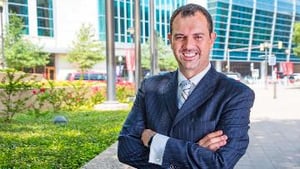 lead article by Deborah Hensler and Damira Khatam. There, Professor Garcia critiques investor-state arbitrators’ reliance on the traditionally private law remedy of money damages even as they adjudicate public law claims. Professor Garcia brings an international perspective to his courses and service. He teaches International Commercial Arbitration, co-led Texas A&M Law’s Global Law Field Course in Aberdeen, Scotland (described below), and incorporated negotiation and dispute resolution clauses into Texas A&M Law’s Borderlands Program on the regulation of hydrocarbons in Mexico and the United States. Working with Texas A&M Law’s librarians, Professor Garcia launched an online research guide on arbitration for students, including a special section on international dispute resolution mechanisms and international oil and gas disputes. He also serves as Co-Director of the Gulf of Mexico Project as an Affiliated Scholar of the University of Houston’s Center for U.S. and Mexican Law and is an Affiliated Scholar of the Energy Institute of Texas A&M University.
lead article by Deborah Hensler and Damira Khatam. There, Professor Garcia critiques investor-state arbitrators’ reliance on the traditionally private law remedy of money damages even as they adjudicate public law claims. Professor Garcia brings an international perspective to his courses and service. He teaches International Commercial Arbitration, co-led Texas A&M Law’s Global Law Field Course in Aberdeen, Scotland (described below), and incorporated negotiation and dispute resolution clauses into Texas A&M Law’s Borderlands Program on the regulation of hydrocarbons in Mexico and the United States. Working with Texas A&M Law’s librarians, Professor Garcia launched an online research guide on arbitration for students, including a special section on international dispute resolution mechanisms and international oil and gas disputes. He also serves as Co-Director of the Gulf of Mexico Project as an Affiliated Scholar of the University of Houston’s Center for U.S. and Mexican Law and is an Affiliated Scholar of the Energy Institute of Texas A&M University.
Several of Professor Michael Z. Green’s recent articles focus on the intersection of race and dispute resolution. He organized a symposium at Dedman School of Law of Southern 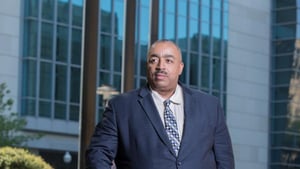 Methodist University to reconsider Professor Richard Delgado’s and others’ critiques of ADR. The symposium resulted in a two-part ADR issue of the SMU Law Review, which included articles by Professor Delgado, Professor Green, and many other key scholars and leaders of dispute resolution programs (including our own director, Professor Welsh). Professor Green’s latest article is Negotiating Race in the Workplace After Trump for a special issue of the Negotiation Journal on the impact of President Trump on the negotiation field. Also in late 2017, a federal district court cited Professor Michael Green’s co-authored article, Can NFL Players Obtain Judicial Review of Arbitration Decisions on the Merits When a Typical Hourly Union Worker Cannot Obtain This Unusual Court Access? The article was cited in the case of NFL Mgmt. Council v. NFL Players Ass’n, 296 F.Supp. 3d 614, 625 (S.D.N.Y. 2017).
Methodist University to reconsider Professor Richard Delgado’s and others’ critiques of ADR. The symposium resulted in a two-part ADR issue of the SMU Law Review, which included articles by Professor Delgado, Professor Green, and many other key scholars and leaders of dispute resolution programs (including our own director, Professor Welsh). Professor Green’s latest article is Negotiating Race in the Workplace After Trump for a special issue of the Negotiation Journal on the impact of President Trump on the negotiation field. Also in late 2017, a federal district court cited Professor Michael Green’s co-authored article, Can NFL Players Obtain Judicial Review of Arbitration Decisions on the Merits When a Typical Hourly Union Worker Cannot Obtain This Unusual Court Access? The article was cited in the case of NFL Mgmt. Council v. NFL Players Ass’n, 296 F.Supp. 3d 614, 625 (S.D.N.Y. 2017).
In 2018, Professor Carol Pauli served as a faculty member at the Poynter Leadership Academy for Women in Digital Media. The Poynter Institute is a leading journalism training center and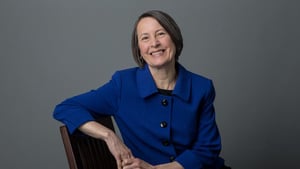 think tank, and the young women participants work for news outlets including USA Today, Politico, PBS, HuffPost, Newsday, Vox, NPR, the New York Times, and the Washington Post. Professor Pauli’s article, Enemy of the People: Negotiating News at the White House, will be published in the Ohio State Journal on Dispute Resolution. And along with John Marks, the founder of Search for Common Ground, Professor Pauli spoke on the role of journalism in “Changing Attitudes and Behaviors Through the Media” at the 2017 Jed D. Melnick Symposium at Cardozo Law.
think tank, and the young women participants work for news outlets including USA Today, Politico, PBS, HuffPost, Newsday, Vox, NPR, the New York Times, and the Washington Post. Professor Pauli’s article, Enemy of the People: Negotiating News at the White House, will be published in the Ohio State Journal on Dispute Resolution. And along with John Marks, the founder of Search for Common Ground, Professor Pauli spoke on the role of journalism in “Changing Attitudes and Behaviors Through the Media” at the 2017 Jed D. Melnick Symposium at Cardozo Law.
Professor Peter Reilly is Chair-Elect of the ADR Section of the Association of American Law Schools (AALS), and the ADR Section has been selected as this year’s AALS Section of Year. In  his role as Chair-Elect, Peter is organizing and moderating a panel for the Annual Meeting taking place in New Orleans (January 2-6, 2019). The panel, composed of eight scholars from throughout the country, will address “The Promise and Pitfalls of Technology in Dispute Resolution” and will speak to questions involving access to justice and the impact of disruptive technologies (including AI, blockchain, smart contracts, and the like). Professor Reilly continues as the Competition Chair of the ABA Section on Dispute Resolution’s James B. Boskey Law Student Essay Competition on Alternative Dispute Resolution. Professor Reilly’s latest article, Sweetheart Deals, Deferred Prosecution, and Making a Mockery of the Criminal Justice System: U.S. Corporate DPAs Rejected on Many Fronts, will be published in early 2019 in the Arizona State Law Journal.
his role as Chair-Elect, Peter is organizing and moderating a panel for the Annual Meeting taking place in New Orleans (January 2-6, 2019). The panel, composed of eight scholars from throughout the country, will address “The Promise and Pitfalls of Technology in Dispute Resolution” and will speak to questions involving access to justice and the impact of disruptive technologies (including AI, blockchain, smart contracts, and the like). Professor Reilly continues as the Competition Chair of the ABA Section on Dispute Resolution’s James B. Boskey Law Student Essay Competition on Alternative Dispute Resolution. Professor Reilly’s latest article, Sweetheart Deals, Deferred Prosecution, and Making a Mockery of the Criminal Justice System: U.S. Corporate DPAs Rejected on Many Fronts, will be published in early 2019 in the Arizona State Law Journal.
Professor Welsh became Director of the Aggie Dispute Resolution Program in September, 2017. Completing her service to the ABA Section of Dispute Resolution as Immediate Past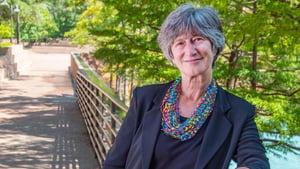 Chair in August, 2018, she is now chairing the Dispute Resolution Section’s Advisory Committee on Dispute Resolution Research. Her latest article, Dispute Resolution Neutrals’ Ethical Obligation to Support Measured Transparency, will appear in early 2019 in the Oklahoma Law Review. The Texas Bar Foundation chose her 2017 article, Do You Believe in Magic?: Self-Determination and Procedural Justice Meet Inequality in Court-Connected Mediation, to receive the Foundation’s 2018 Outstanding Law Journal Article Award. More information is available here. In addition to organizing Texas A&M Law’s new courses for 1Ls and M.Jur. students, she co-led a Global Programs Field Study Course focusing on dispute resolution and natural resources management in Israel (described below). In the past year, she has also made invited presentations at Columbia Law School, the European University Viadrina, Singapore Management University, International Islamic University, the University of Malaya, and the Asian International Arbitration Centre.
Chair in August, 2018, she is now chairing the Dispute Resolution Section’s Advisory Committee on Dispute Resolution Research. Her latest article, Dispute Resolution Neutrals’ Ethical Obligation to Support Measured Transparency, will appear in early 2019 in the Oklahoma Law Review. The Texas Bar Foundation chose her 2017 article, Do You Believe in Magic?: Self-Determination and Procedural Justice Meet Inequality in Court-Connected Mediation, to receive the Foundation’s 2018 Outstanding Law Journal Article Award. More information is available here. In addition to organizing Texas A&M Law’s new courses for 1Ls and M.Jur. students, she co-led a Global Programs Field Study Course focusing on dispute resolution and natural resources management in Israel (described below). In the past year, she has also made invited presentations at Columbia Law School, the European University Viadrina, Singapore Management University, International Islamic University, the University of Malaya, and the Asian International Arbitration Centre.
Thomas Stipanowich, Hagler Institute Faculty Fellow
In Fall 2018, Professor Thomas Stipanowich joined Texas A&M Law and the College of 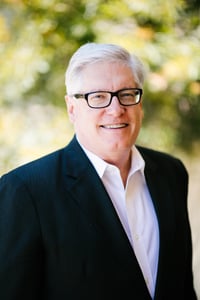 Architecture as a Hagler Institute Faculty Fellow. Professor Stipanowich holds the William H. Webster Chair in Dispute Resolution at Pepperdine University School of Law, where he is Dean of the Straus Institute for Dispute Resolution. While at Texas A&M, Professor Stipanowich has made presentations at the Law School, the College of Architecture, and various conferences and symposia and has met with students and faculty colleagues. We feel very lucky to benefit from his wisdom, collegiality and experience.
Architecture as a Hagler Institute Faculty Fellow. Professor Stipanowich holds the William H. Webster Chair in Dispute Resolution at Pepperdine University School of Law, where he is Dean of the Straus Institute for Dispute Resolution. While at Texas A&M, Professor Stipanowich has made presentations at the Law School, the College of Architecture, and various conferences and symposia and has met with students and faculty colleagues. We feel very lucky to benefit from his wisdom, collegiality and experience.
The Hagler Institute for Advanced Study at Texas A&M University provides a catalyst to enrich the intellectual climate and educational experiences at Texas A&M. It is a mechanism for attracting world-class talent to the University and is driven by nominations of National Academy and Nobel-prize caliber researchers that align with existing strengths and ambitions of the University. Each year the Hagler Institute invites a number of nationally and internationally prominent Faculty Fellows to pursue advanced study at the Hagler Institute in collaboration with faculty and student scholars at Texas A&M. The goal is to provide a stellar environment for research and scholarship, providing the Faculty Fellows with freedom to pursue their own research interests as well as collaborate in disciplinary and multidisciplinary research.
Professor Stipanowich joins several other Hagler Institute Faculty Fellows whose primary affiliation has been with Texas A&M Law, including Richard Epstein (New York University), Tom Ginsburg (University of Chicago) and Joseph Singer (Harvard). More information is available here.
Kay Elliott, TMCA Outstanding Credentialed Mediator Award
Texas A&M Law hosted the Texas Mediator Credentialing Association’s 13th annual symposium, entitled “Trailblazers in Mediation: Exploring New Pathways.” During the  symposium, the TMCA honored Adjunct Professor Elliott with its 2017 Outstanding Credentialed Mediator Award. In addition to serving as a long-time mediator and faculty member, Professor Elliott coaches Texas A&M Law’s ADR teams. They have won two national ABA negotiation competitions and multiple regional competitions. She also coached the Texas A&M Law National Champion Representation-in-Mediation Team and served as a judge for the 2015 International Law Student Negotiation Competition in Dublin, Ireland. More information is available here.
symposium, the TMCA honored Adjunct Professor Elliott with its 2017 Outstanding Credentialed Mediator Award. In addition to serving as a long-time mediator and faculty member, Professor Elliott coaches Texas A&M Law’s ADR teams. They have won two national ABA negotiation competitions and multiple regional competitions. She also coached the Texas A&M Law National Champion Representation-in-Mediation Team and served as a judge for the 2015 International Law Student Negotiation Competition in Dublin, Ireland. More information is available here.
ABA Competitions Championships
Texas A&M Law earned a top 10 finish in the inaugural ABA Competitions Championships for its teams’ achievements and participation in the ABA’s arbitration, negotiation, client counseling, and national appellate advocacy competitions. Texas A&M law students Kaitlyn 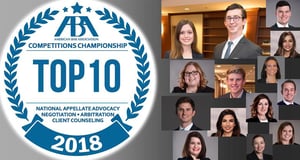 Pound and Grant Moore finished as national semifinalists at the Client Counseling National Competition while other recent successes included a regional semifinalist, regional fourth place best brief and best advocate, and a top 10 best advocate. The ADR teams were coached by Adjunct Professor Kay Elliott. More information is available here. In addition, thanks to the work of Advocacy Program Director Jennifer Ellis, Texas A&M Law will become a charter member of the National Advocacy Competition Association, a new organization that will set standards for student training in advocacy programs, address uniformity and fairness in advocacy competitions, and assure that advocacy programs have proper metrics and professionalism standards.
Pound and Grant Moore finished as national semifinalists at the Client Counseling National Competition while other recent successes included a regional semifinalist, regional fourth place best brief and best advocate, and a top 10 best advocate. The ADR teams were coached by Adjunct Professor Kay Elliott. More information is available here. In addition, thanks to the work of Advocacy Program Director Jennifer Ellis, Texas A&M Law will become a charter member of the National Advocacy Competition Association, a new organization that will set standards for student training in advocacy programs, address uniformity and fairness in advocacy competitions, and assure that advocacy programs have proper metrics and professionalism standards.
CURRICULUM HIGHLIGHTS
New Required ADR Survey Course for 1Ls
In January, 2018, Texas A&M Law launched an intensive 1-credit Dispute Resolution Survey course that all first-year law students are required to take during the week prior to Spring semester. Over five days, the course introduces the students to the continuum of legal dispute resolution processes, particularly negotiation, mediation, arbitration, and new developments such as collaborative law and online dispute resolution. Texas A&M Law’s Dispute Resolution Program faculty team-teach the course. Each faculty member focuses on his or her area of specialization. Professors Cynthia Alkon and Peter Reilly introduce the 1Ls to negotiation concepts and skills. Professors Nancy Welsh and Carol Pauli focus on mediation and new developments, and Professors Michael Green and Guillermo Garcia provide an overview of the practice and law of arbitration. Although the course includes substantial reading and some lecture, the students also engage in hands-on learning through exercises and simulations. By the end of the course, Texas A&M law students should be able to counsel clients regarding the basic differences among these processes, identify the issues that are important in choosing among and participating in them, and understand the role of lawyers.
New Global Programs Field Study Courses on Dispute Resolution in Israel and Scotland
Texas A&M Law students participated in Global Program Field Study courses in Israel and Scotland. While the students’ two-week visits to Israel and Scotland occurred in May, 2018, the students began their preparations during the Spring 2018 semester and will produce their research papers in Fall 2018.
Professors Nancy Welsh and Gabriel Eckstein led the Field Study course in Israel. It focused on water and energy management and dispute resolution. Students met with policy makers, lawyers, entrepreneurs, and academics responsible for negotiating regional treaties collaborating to redress environmental issues in the West Bank and East Jerusalem, developing and operating facilities for water desalination and wastewater treatment, and advising regarding the development of recently-discovered natural gas reserves. Students’ research projects will address a variety of issues and include comparisons to U.S. law and technology. More information is available here.
Professors Guillermo Garcia and Randy Gordon led the Field Study course in Scotland. It introduced students to the world of international energy law and the resolution of energy disputes. Students became familiar with the types of international legal instruments that regulate global energy companies as well as dispute resolution mechanisms. During their visit to Scotland, students explored these issues with a range of guest speakers, including attorneys, academics, and regulators. Students also have been introduced to offshore regulation in the Gulf of Mexico, with the goal of being able to advise clients on how the global energy market is regulated. More information is available here.
New Perspectives on Dispute Resolution in Texas Course
In August, 2018, Texas A&M Law offered a new course focused particularly on dispute resolution practice in Texas. Designed and led by Adjunct Professor Kim Kovach, the course introduced students to Texas’ history with dispute resolution and to individuals and organizations key to its institutionalization and operation, ranging from the Dallas offices of JAMS and the American Arbitration Association to the Dispute Resolution Center of North Texas in Fort Worth and individual mediators and arbitrators practicing in the region. Professor Kovach has been a leader and visionary in dispute resolution for over 35 years. She created and conducted the first mediation training in Texas, served as Chair of the ADR Sections of the Texas and Houston bar associations and the ABA Section of Dispute Resolution, and has authored numerous influential books and articles. We are honored that she has joined us in preparing our students for the modern practice of law and dispute resolution.
New Masters of Jurisprudence Course in Negotiation and Dispute Resolution for Business
In Spring 2018, Texas A&M Law launched a 1.5-credit course on Negotiation and Dispute Resolution in Business for students participating in the new M. Jur. program in San Antonio. Dispute Resolution Program faculty members team-taught this course, each focusing on his or her area of specialization.
Updated Dispute Resolution Concentration
Texas A&M Law has offered its students a Concentration in Dispute Resolution for several years. Students now are required to take core courses in dispute resolution generally, as well as negotiation, mediation and arbitration. A long list of electives includes additional dispute resolution courses as well as participation in credit-earning ADR competitions and clinics that provide for substantial student involvement in representing clients in negotiation or mediation. More information is available here.
EVENT HIGHLIGHTS
Conference: Natural Disasters, Stakeholder Engagement, and Dispute Resolution (April 2018)
Responding to the devastation caused by Hurricanes Harvey, Irma, and Maria, Texas A&M Law’s Dispute Resolution Program brought together public leaders, judges, lawyers, dispute resolution professionals and academics in April, 2018, to examine how dispute resolution and collaborative processes can play a role in recovery and resilience. The conference was co-sponsored by three other programs at Texas A&M Law: the Natural Resources Systems Program, Program on Real Estate and Community Development Law, and Global Programs. Presenters included faculty members from other Texas A&M University departments as well as: Marvin Odum, former president of Shell Oil Company, who was appointed by Houston’s mayor to serve as Chief Recovery Officer; Grande Lum, former Director of the U.S. Department of Justice Community Relations Service; James Pearman, FEMA ADR Advisor; Robert Jerry, Isidor Loeb Professor of Law at University of Missouri School of Law; U.S. Magistrate Judge Ramon Reyes and ADR Administrator Robyn Weinstein of the Eastern District of New York Court; and Kim Taylor, Senior Vice President and Chief Legal and Operating Officer of JAMS. Articles will be published in the Texas A&M Law Review and the Texas A&M Journal of Property Law. More information is available here.
Symposium: Shining a Light on Dispute Resolution: Transparency, Metrics and Empirical Research (November 2018)
In November, 2018, Texas A&M Law held its Dispute Resolution Symposium, focusing on the need for transparency, metrics, and empirical research regarding court-connected mediation and online dispute resolution, plea bargaining and deferred prosecution agreements, and diversity/inclusivity among dispute resolution neutrals. Texas A&M Law also held its inaugural regional dispute resolution “schmooze,” providing an opportunity to present academic works-in-progress and provide feedback to the National Centre for State Courts and The Pew Charitable Trusts regarding their evaluation of court-connected ODR. Much more information about the symposium and schmooze is available here.
Integration of Dispute Resolution into Upcoming Program Events at Texas A&M Law
Other programs at Texas A&M Law regularly include dispute resolution in their conferences and symposia. For example, Texas A&M Law’s 2018 annual Energy Law Symposium brought together academics and practitioners of Texas and Mexico to discuss the future and impact of energy--and included a panel discussion on investment arbitration as well as a presentation by Texas A&M Law student Jill Chandler Saul-Schmitz on oil and gas arbitration. The 2019 Energy Law Symposium will explore the role and perspective of consumers, municipalities, universities, corporations, and other grassroots actors in the energy economy and will include a panel on dispute resolution between energy companies and local communities.
The Aggie Dispute Resolution Program is co-sponsoring the Global Lawyering Program’s conference on February 28-March 1, 2019--Is There a North American Region Post-NAFTA? The U.S.- Mexico Puzzle—which will include a panel on dispute resolution. Also, the Aggie Dispute Resolution Program is co-sponsoring the Workplace Law Program’s April 5, 2019 conference--Modern Social Movements and Their Workplace Impact—which will consider the relationship between phenomena like the #MeToo movement and mandatory pre-dispute employment arbitration of sexual harassment claims.
Collaboration with Other Dispute Resolution Programs
The Aggie Dispute Resolution Program currently is working with Pepperdine’s Straus Institute, the ABA Section of Dispute Resolution, and other dispute resolution leaders to offer a conference entitled Appreciating Our Legacy and Engaging the Future: An International Conference for Dispute Resolution Teachers, Scholars, and Leaders on June 18-19, 2019 at Pepperdine University.
RECENT FACULTY SCHOLARSHIP
(2016 – Present)
Cynthia Alkon
With Andrea Schneider, Negotiating Crime: Plea Bargaining, Problem Solving, and Dispute Resolution in the Criminal Context (forthcoming, 2019).
Standing the Test of Time: Galanter’s Analysis of the “Limits of Legal Change” as Applied to the U.S. Criminal Justice System, in Discussions in Dispute Resolution (Cole, Hinshaw & Schneider, eds) (forthcoming).
Plea Bargaining: An Example of Negotiating with Constraints, in The Negotiator’s Desk Reference, Vol. I (Honeyman & Schneider, eds, 2017).
Hard Bargaining in Plea Bargaining: When Do Prosecutors Cross the Line? 17 Nev. L.J. 401 (2017).
Plea Bargain Negotiations: Defining Competence Beyond Lafler and Frye, 53 Am. Crim. L. Rev. 377 (2016).
Guillermo Garcia
International Law on the Exploitation of Transboundary Hydrocarbon Resources and the Mexican Energy Reform (Tirant Lo Blanch, 2018) (in Spanish).
The Blurring of the Public/Private Distinction or the Collapse of a Category? The Story of Investment Arbitration, 18 Nev. L. J. 489 (2018).
To Speak With One Voice: The Political Effects Of Centralizing The International Legal Defense Of The State, 34 Ariz. J. Int’l & Comp. L. 557 (2017).
A New International Legal Regime for a New Reality in the War Against Drugs, 58 Harv. Int’l L. J. Online 39 (2017).
A Critical Approach to International Investment Law, the Hydrocarbons Industry and its Relation with Domestic Institutions, 57 Harv. Int’l. L. J. 476 (2016).
Michael Z. Green
Negotiating Race in the Workplace After Trump, __ Neg. J. __ (forthcoming in special issue on the impact of President Trump on the negotiation field).
Rewritten Opinion of Clark County School District v. Breeden in Feminist Judgments: Employment Discrimination Opinions Rewritten (McGinley & Porter, eds.) ((forthcoming).
Framing the Debate to Show How Big Guys Insist that Little Guys Arbitrate as a “Corporate Tool,” in Discussions in Dispute Resolution (Cole, Hinshaw & Schneider, eds) (forthcoming).
With Ellen Deason, Donna Shestowsky, Rory Van Loo & Ellen Waldman, ADR and Access to Justice: Current Perspectives, 33 Ohio St. J. on Disp. Resol.___ (forthcoming) (transcript of panel discussion).
Developing Workplace Law Programming: A Labor of Love, 86 UMKC L. Rev. 521 (2018).
Reconsidering Prejudice in Alternative Dispute Resolution for Black Work Matters, 70 SMU L. Rev. 639 (2017).
The Audacity of Protecting Racist Speech Under the National Labor Relations Act, 2017 U. Chi. Legal F. 235 (2017).
With Kyle Carney, Can NFL Players Obtain Judicial Review of Arbitration Decisions on the Merits When a Typical Hourly Union Worker Cannot Obtain This Unusual Court Access?, 20 N.Y.U. J. Legis.& Pub. Pol’y 403 (2017).
Negotiating While Black, in The Negotiator’s Desk Reference, Vol. I (Honeyman & Schneider, eds., 2017).
Employer-Provided Legal Services for Employment Claims, in Beyond Elite Law: Access to Civil Justice in America (Estreicher & Radice, eds., 2016).
Carol Pauli
Trina Grillo: Productive Rage, in Discussions in Dispute Resolution (Cole, Hinshaw & Schneider, eds.) (forthcoming).
Enemy of the People: Negotiating News at the White House, __ Ohio St. J. on Disp. Resol.__ (forthcoming).
Atrocity Speech Law: Addressing Hate that Does Harm, 40 Human Rights Q. 718 (2018).
“Fake News,” No News, and the Needs of Local Communities, 61 How. L. J. 563 (2018).
Whole Other Story: Applying Narrative Mediation to the Immigration Beat, 18 Cardozo J. Conflict Resol. 23 (2016).
Peter Reilly
Sweetheart Deals, Deferred Prosecution, and Making a Mockery of the Criminal Justice System: U.S. Corporate DPAs Rejected on Many Fronts, __ Ariz. St. L. J. __ (forthcoming).
Machiavelli and the Bar: J.J. White as Negotiation Ethics Architect, in Discussions in Dispute Resolution (Hinshaw, Cole & Schneider, eds.) (forthcoming).
Deferred Prosecution as Discretionary Injustice, 2017 Utah L. Rev. 389 (2017).
Should Companies Always Fess Up to Corruption? Why It Can Be Strategically Wise Not to Self-Report Violations of Anti-Corruption Laws, 42 Cayman Fin. Rev. 78 (2016).
Nancy A. Welsh
The Untethering of Mediation from Relationships, in Discussions in Dispute Resolution (Cole, Hinshaw & Schneider, eds.) (forthcoming).
Dispute Resolution Neutrals’ Ethical Obligation to Support Measured Transparency, __ Okla. L. Rev. __ (forthcoming).
With Louis Del Duca, Interpretation and Application of the New York Convention in the United States, in The Recognition and Enforcement of Foreign Arbitral Awards--Application of the New York Convention by National Courts 995 (George A. Bermann ed., 2017).
Perceptions of Fairness, in The Negotiator’s Desk Reference, Vol. I (Honeyman & Schneider, eds., 2017).
Do You Believe in Magic?: Self-Determination and Procedural Justice Meet Prejudice in Court-Connected Mediation, 70 SMU L. Rev. 721 (2017).
Class Action-Barring Mandatory Pre-Dispute Consumer Arbitration Clauses: An Example of (and Opportunity for) Dispute System Design, 13 St. Thomas L. J. 381 (2017).
Magistrate Judges, Settlement and Procedural Justice, 16 Nev. L. J. 983 (2016).